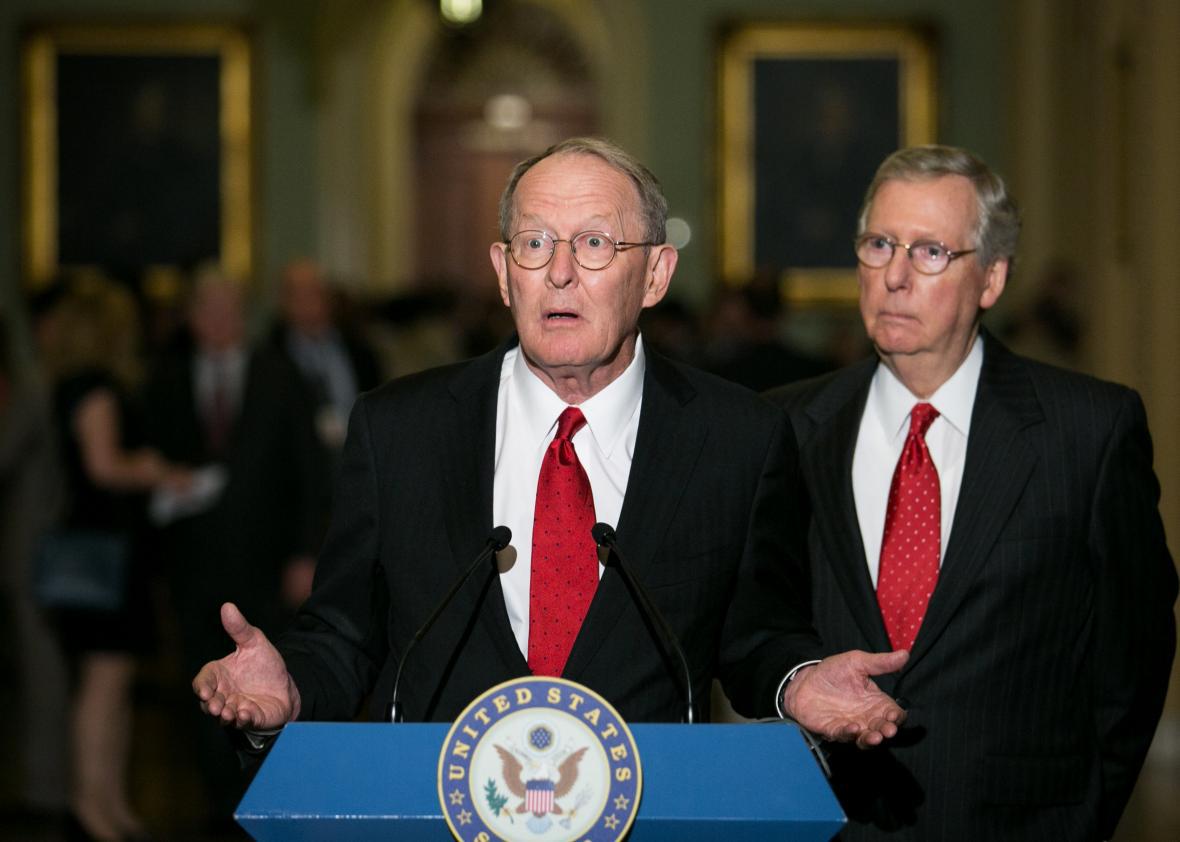Republicans may control the White House and Capitol Hill, but repealing and replacing Obamacare is going to be a long and probably torturous process. How do we know? Because the GOP is already saying so. On Thursday, Senator Lamar Alexander of Tennessee admitted to reporters that the entire journey could take “several years.”
Alexander’s comments are worth special attention because, as chair of the Senate’s Health, Education, Labor, and Pensions Committee, he is going to play an absolutely crucial role in any kind of health reform effort next year. And as of now, he’s signaling that any legislation will need to contain some sort of bipartisan compromise.
“Eventually, we’ll need 60 votes to complete the process of replacing Obamacare and repealing it because Obamacare was not passed by reconciliation it was passed by 60 votes. And it was cleaned up by reconciliation because Scott Brown won his election,” Alexander told reporters, according to Talking Points Memo. “Before the process is over, we’ll need a consensus to complete it, and I imagine this will take several years to completely make that sort of transition to make sure we do no harm, create a good health care system that everyone has access to and that we repeal the parts of Obamacare that need to be repealed.”
There’s lots to unpack in that paragraph. First, it’s further confirmation that the Senate filibuster is going to survive during the Trump administration, a fact that should cheer Democrats who were worried they might spend the next two to four years getting steamrolled on every major piece of legislation. Second, Alexander for now seems to be rejecting the theory, pushed by some conservatives, that the Senate can repeal the entire Affordable Care Act through budget reconciliation, a procedure that prevents filibusters on certain tax and spending legislation. As the senator notes, many people mistakenly believe that the entirety of Obamacare was passed through reconciliation in the first place. But as former Senate Parliamentarian Alan Frumin has explained, that’s untrue—the House and Senate actually passed a version of the legislation that contained its major features, then passed a second reconciliation bill to tweak it afterward. The two bills were even signed on separate days. (There’s a separate argument that, since Obama’s spending and regulations were meant to work in tandem, they should both be repealable through reconciliation. For now, it’s not clear anybody in the Senate buys that.)
So long as you can’t kill Obamacare outright with reconciliation, repealing and replacing it is going to have to overcome a filibuster, which will mean rounding up support from at least eight Democrats in the coming Senate.
Alexander also seems to want to have some sort of a replacement bill in the works before Congress repeals the current law. “The exchanges are the first problem, they need to be repealed, the individual mandate needs to be repealed. There are a number of things that need to be repealed, but I think what we need to focus on first is what would we replace it with and what are the steps that it would take to do that?” he said.
This is a bit of a surprise. Because Republicans haven’t yet agreed on their own version of health reform, a lot of people expected they would simply pass a reconciliation bill sunsetting Obamacare’s major features over the next couple of years and then use the transition period to come up with a new system. That approach poses its own problems. As I explained a few days ago, it would probably throw the Affordable Care Act’s existing insurance exchanges into chaos; with the law set to disappear, many carriers would simply bail from markets rather than risk losing more money on them without the possibility of a long-term payoff. Still, it seemed possible that some Republicans might welcome the havoc as a way to force Democrats to the bargaining table.
Alexander seems to have something more orderly and cooperative in mind. Will things actually play out that way? Who knows. But as of now, it looks like the next round of the Obamacare wars are going to be an extended, slow-burning fight.
